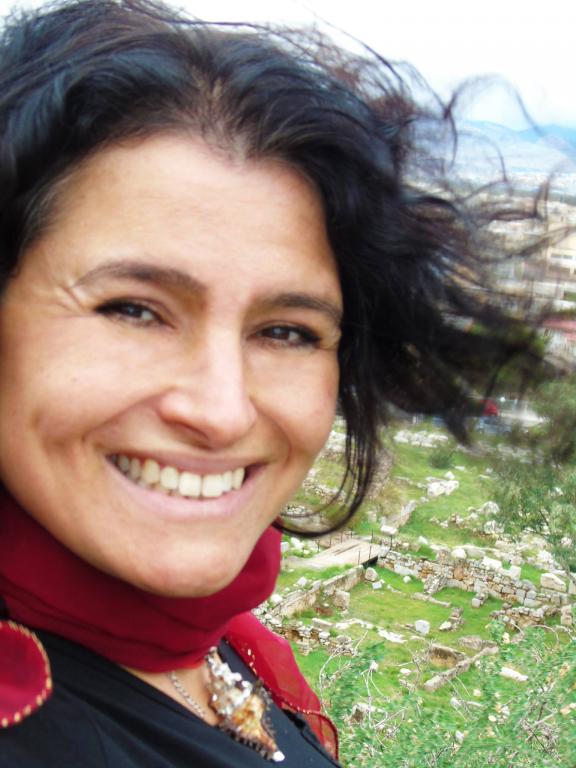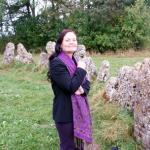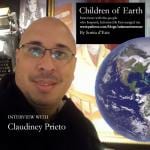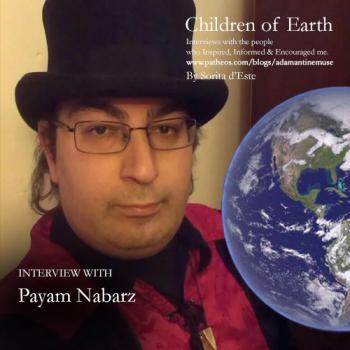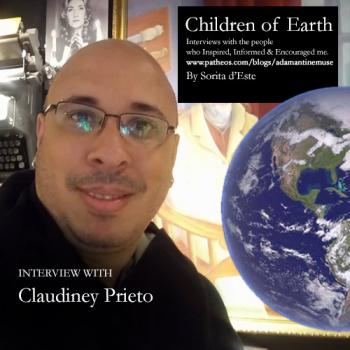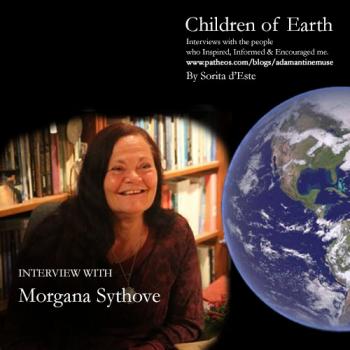David Beth is an exceptionally passionate man, dedicated to Gnosis through his esoteric studies and practices. He was born in Angola, educated in Germany and the USA, and he has lived in Nigeria, Brazil and the UK along the way. In this interview David shares how his childhood fascination with spiritual mysteries led him on a spiritual quest, towards becoming a Houngan Asogwe of Haitian Vodou, as well as an initiate of a number of other traditions.
His work came to my attention after the publication of his book Voudon Gnosis (2010) and I have since followed his work in the spaces between my other commitments. We finally had the opportunity to meet spend time together in Belgium at PaGE2016 which was an interesting – and memorable – experience. David inspires me with his single-minded devotion for his work, which reflects the commitment he has to his chosen spiritual pathway(s). It is my belief that through such commitment and passionate dedication the primordial spiritual pathways will remain available and strong into the future. I look forward to learning much more about this man, this priest and his work into the future.
Interview with David Beth
By Sorita d’Este
Children of Earth: People who Inspired, Informed or Encouraged me.
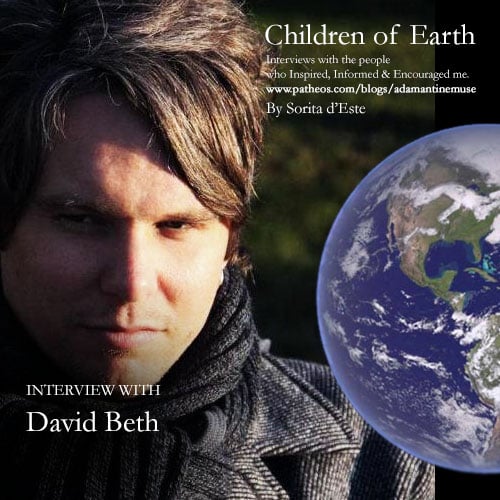
Sorita : Like me, you spent your childhood in Africa, encountering indigenous beliefs and practices there. How did this shape your subsequent study and practice of magic and religion?
David Beth: I spent nearly 20 years in Africa and its spiritual and religious life influenced me tremendously. I was lucky that my father especially had a keen interest in African spirituality. During our life in Angola, he thoroughly researched the religious beliefs of the local tribes and collected ‘spiritual artefacts’. When we lived in Nigeria we very often had religious leaders and artists at our home. I was personally acquainted with Suzanne Wenger, the famous guardian of the Oshogbo shrines and priestess of Oshun. We also travelled extensively around West Africa visiting remote tribes, religious sites and attending many festivals and rituals of Vodou, Ifa etc.
A priestess once took me aside, I must have been a young teenager at the time, and told me that someday I would serve the spirits and become a bridge between Africa and the West as I was a spiritual child of two worlds: Africa and Europe (my parents are both German). I have experienced many strange and wonderful spiritual things in Africa, relating from Juju magic to beautiful, elaborate religious ceremonies. In Africa, the spiritual and profane worlds are not divided, they flow together in the everyday experience of people. This deeply affected me, as I also always found my spiritual experiences deeply entangled with my ‘profane’ world and ways of thinking. Regardless of my place of residence, or what I was doing in my life, the enthusing power of the African spirits always intruded into my life and called to me strongly.
Sorita : If you had to choose one single incident in your life to be the “point of no return” for your pursuit of esoteric knowledge, what would it be and why?
David: I am not sure if one such moment existed but there was a period in my life (around 15/16 yrs old) where I found that the things that truly concerned me were not what my peers were concerned or worried about. They would often come to me with their troubles and issues and while I had no problem advising them I felt that nobody understood my concerns, which were of a different ‘order’. I was contemplating the reality of life, Nietzsche’s eternal return, and wondering whether a world of spirits did exist and if so how it would intrude into our life. One of my main occupations was the Nietzschean concept of the Death of God and what this would mean for our individual freedom. I was lucky that I was never raised religiously in a strict sense, and had access to a vast library of philosophical and spiritual works via my parents and, as you know, in Africa, there were no good TV programs back in the 80s – so instead I read a lot. These contemplations led me to decide that I was going to try to ‘magick’ and see whether this could answer some of the questions. It did answer some questions, and I never turned back…
Sorita : Are the Gods and Spirits real, external entities – or something else?
David: To me, the spirits are absolutely real, independent of us. I am in no way a ‘Jungian’ occultist. I believe in a world full of enthusing powers which we could call daemons. I follow Ludwig Klages here who said that “the body is the manifestation of the soul and the soul is the meaning of the living body.” This means that the phenomenal universe is a manifestation of myriad enthusing powers, irreducible to One Source and never just aspects of one higher Being (or non-being). The individual human, of course, falls under the same daemonic category but is cut off from this daemonic experience through the ‘spirit’ which manifests in humanity mainly as the rational mind and will to power. Of course, this is a very complex metaphysical field, and much more can and must be said about this.
Sorita : You studied with Michael Bertiaux, a name which might not be familiar with readers of this blog who come from a Pagan or Goddess background. Who was he, and why is he important and relevant today?
David: Michael Bertiaux is one of the most imaginative and interesting modern Gnostics. Rather than a truly coherent system, his spiritual teachings must be mainly understood as an exercise in mind power and mind development. He teaches a philosophical and esoteric idealism and transcendentalism aimed at creating phantastic mental universes by connecting to the ultimate source of Being/Non-Being. So his system is essentially a Western Gnosis, even though he often uses terminology from other spiritual traditions such as Vodou, Vedic spirituality etc. One main issue is that his system has come to be known as Voudon Gnosis and that people expect to find some form of Voudon, but this is ultimately not the case. Despite using Vodou concepts and terms at times to explain a modus operandi, his teachings are not really rooted in any type of Vodou.
I was once the Sovereign Grand Master of Bertiaux’ orders, the Ordo Templi Orientis Antiqua and the La Couleuvre Noire but resigned from all positions in 2009 after I felt that all my tasks there had been completed. I longed to return to the roots of my spiritual life, to the world of enthusing daemonic powers and the African spirits. My work already had taken a strong shift towards a non-transcendental Gnosis and I felt that the OTOA/LCN was not suited as a vehicle for such a shift, as they were designed to teach the Uranian and transcendental Gnosis of Bertiaux. Consequently, I organised the pandaemonic ‘Kosmic’ Gnosis to which are aligned various organisations such as the Societe Voudon Gnostique and the Ecclesia Gnostica Aeterna. Primarily, these groups teach the mysteries of a cyclical Maternal Kosmos of daemonic powers with whom we engage in an inherently erotic, ecstatic way.
Sorita: There are many cosmologies (or pantheons) providing explanations for the relationships between the Gods, spirits, humans and the natural world. Western and African cosmologies sometimes have very little in common on the surface, although particular themes do appear which echo each other. Reflecting on your earlier ideas on the blend of African and European beliefs and practices, how compatible do you feel they are today?
David: I think this depends. Random mixing of concepts and ideas, which seems to be a very typically Western thing, is highly problematic – and reflects the modern Western mind and its inability to truly connect to enthusing forces which have been reduced to symbols and metaphors and which thus can never manifest their true power and glamour. This then leads, at best, to a Jungianization of spiritual systems and concepts, and thus to satisfaction of a certain intellectual curiosity or lust for theatrical exercises, but never or rarely to a breakthrough into the divine world of enthusing images.
Philosophical and religious transcendentalism have the West in a spiritual stranglehold (and this also is true for Neo-paganism). In Africa we often have a similar problem but much less severe – people living between worlds. They are on the one hand still rooted in a biocentric and indigenous religious experience and a world which always also is closely tied in with community and relations – and on the other, exposed to a Western economic and cultural hegemony which often leads to spiritual maladies and confusions. However, many of Africa’s spiritual systems are still alive and healthy, and maybe we can learn from them to heal and re-empower European ‘pagan’ systems and world-views. But all will depend on whether the Westerner (a Westerner is of course not necessarily white but can also be of African or Asian descent) can overcome the dictatorship of the rational and again re-connect to the powers and faculties of the Soul. At their very root, I believe that all animist and possibly polytheistic spiritualities originate in a certain daemonic experience of the world. The response to this was ‘religious’ and gave rise to pre-historic ‘Pelasgian’ cults. All of these were rooted in a cyclical, maternal world experience – I am personally most interested in the return to these roots of spirituality and experience, and my work focuses on this.
Sorita: What is Pandaemonic ‘Kosmic’ Gnosis? What does it aim to achieve for its practitioners?
David: Basically, the Kosmic Gnosis is a spiritual meta-current which encompasses various groups that operate towards similar goals but each having their specific modus operandi. The Kosmic Gnosis acknowledges a metaphysical conflict in the world, the results of which produce an atomised humanity, unable to connect to the enthusing forces of the living cosmos. In opposition to all transcendental and monotheistic spiritual paths which lead their adherents astray on a vertical path to an illusionary ‘beyond’. The Kosmic Gnosis attempts to restore the individual to his supreme daemonic Self and return her to the experience of a sacred and divine Kosmos. So instead of a spiritual ascent, we embark on a Katabasis. Make no mistake, the pandaemonic path is severely anti-cosmic in the sense that it rejects the fragmented and distorted cosmos of profane ‘day-consciousness’ – or better, it rejects the metaphysical tyrant, the spirit, which distorts our sacred experience of the cosmos. This is why we spell Kosmic with a ‘K’ – to denote the restored Real, the daemonic Kosmos, constantly in flux, and who is born every moment anew from Chaos through the erotic encounter of the human soul with the enthusing souls of the Kosmos.
Sorita: What do you mean by the ‘supreme daemonic Self’?
David: This is the true, the real Self, that we arrive at when we strip away all the debris which mediates and falsifies our experience of the world. Allow me to quote from an essay I recently published:
“From this process of cycle and dynamic tension, it follows that human being, or better human becoming, has no completion! It is always in the process of being made and unmade. The Primordial Way teaches that the Self is bodily centred and psychically composed of an inner black hole within the sanctuary of the Soul. This gap is a space of transformation and exchange with the mysterious forces of the All. Like the multiverse itself about which the initiate remains in a state of wonder, curiosity and longing, this hole is swarming with undefined and unknown elements. As indicated by Novalis, this is the place where the inner and the outer meet. Thus, the true Self is the nexus of all the forces constituting the individual. Such a person is absolutely individual through the unique configuration of the many elements which are also always in flux – this is a fully different and true individuality when compared to the Western worship or realization of the ‘I am’ or Source of Being which is, in fact, absolutely the same in every individual.”
The study of Ludwig Klages’ momentously fascinating work ‘Of Cosmogonic Eros’, released by Theion Publishing, is very helpful in understanding the above concept.
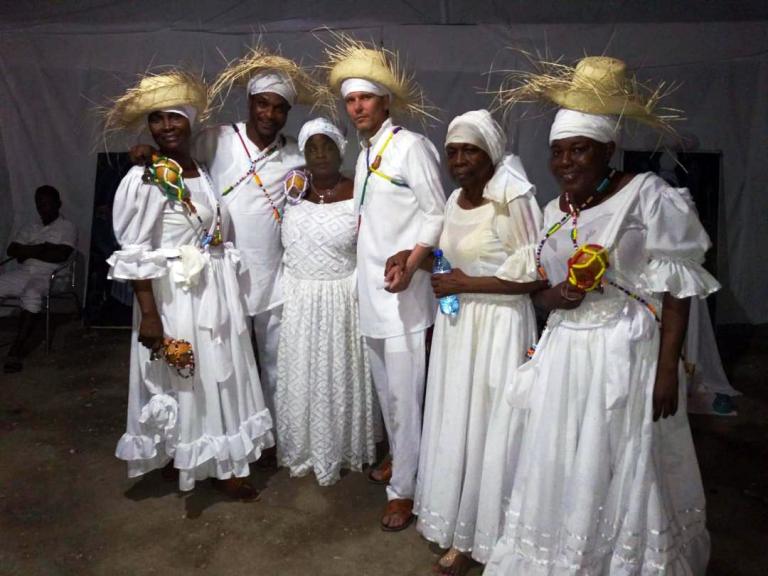
Sorita: One of your primary areas of spiritual work is Vodou, and you are also a Houngan Asogwe (priest) of Haitian Vodou. Is your personal Vodou work different from traditional voudon traditions?
David: Well, yes and no. As Houngan Asogwe, I work in the traditional way as I was taught by my spiritual elders within my lineage. If someone approaches me as Houngan Asogwe and wants a reading or to study Vodou then I teach and work in the traditional way.
However, I also am a member of a Vodou secret society which, while based firmly within the world of Vodou, is specialized in its aims and modus operandi and has incorporated the Gnostic world-view of the ‘Kosmic Gnosis’ which defines much of its nature and orientation. It is thus a Vodou society which acknowledges a ‘Gnostic’ conflict in the outer world and also within the nature of humanity.
Sorita: Many Westerners think of voodoo dolls and bloody animal sacrifices as depicted in films when they hear the word “vodou”. For those readers who are unfamiliar with Voudon could you give a short description of what the traditional ways primary practices and beliefs are?
David: Unfortunately, Vodou is still much misunderstood and misrepresented in the West. What people easily forget is that it is a world religion with many million worshippers around the globe with hot spots in West Africa and Haiti. Originating in West Africa, Vodou is basically the belief in a sacred Universe which is populated by countless spirits, called Loa in Haiti. Every loa is responsible for a particular aspect of life, with the dynamic and changing personalities of each loa reflecting the many possibilities inherent to the elements of life over which they preside.
The Vodou practitioner cultivates personal relationships with these spirits through offerings, sacrifices, dances and possessions etc. Humans and spirits partake of each other’s nature and reality and literally manifest the rhythmic and cyclical reality of a world of constant becoming. Of course, Vodou is a very complex and fascinating religion, and it would take pages to even begin to explain the basics. There are great books out there which introduce the topic such as Maya Deren’s Divine Horsemen or Alfred Metraux’ Voodoo in Haiti and Gert Chesi’s work on African Vodou.
Sorita: After more than 25 years of study and practice, you have gained a great deal of knowledge and experience – and through that you have (I hope!) gained wisdom. If you could go back and give your 20-year old self one piece of advice, what would it be and why?
David: Do not waste your time with esoteric work towards a spiritual ascent. Katabasis is what you need to embark on. The mystery is not beyond the phenomena but within their nimbus and aura.
Sorita: What makes a ritual a successful ritual? How do you measure spiritual or magical success?
David: In a successful ritual, the initiate has the ability to free their soul from the control of the spirit and to mate his soul to the soul of an inseminating daemonic power. Spiritual success should be measured by how intensely a person lived, how deeply she drank from the well of this daemon Life. To quote Nietzsche: “And all in all and on the whole: some day I wish to be only a Yes-sayer.” Magical success should be measured by whether the goal of a magical operation was reached or not.
Sorita : In Africa today, many of the indigenous traditions are under threat, either because of discrimination by Evangelic Christianity or because the indigenous tradition becomes assimilated into new fusion Christian traditions. Along the way, something of the original is lost and forgotten. Your own work is also a fusion, bringing African and European traditions together –albeit in a more syncretic way than the forceful assimilation I have seen by Christian groups in Africa. Do you feel a duty to protect some of the knowledge you have gained, to help those who are seeking to preserve the older traditions do so?
David: All the groups I work with operate in their respective traditional environments, for example, the Ecclesia Gnostica Aeterna within a Western context, while my Vodou work is done in its traditional Haitian context. However, the Vodou Secret Society (Societe Voudon Gnostique), while firmly rooted within a Vodou environment, has absorbed and incorporated various Western Gnostic elements.
In Africa (but also Brasil where I lived for a few years) I have seen the considerable damage done by Evangelical and other Christian Churches but also by the pressures of Islam (in Northern Nigeria for example) and I believe it is of the utmost importance to assist local spiritual leaders in preserving their traditions. I feel a great duty and responsibility to help protect indigenous traditions and, within my limits and capacity, try to help correct many of the wrong assumptions and prejudices about Vodou and the other Afro-centric currents many people hold across the world.
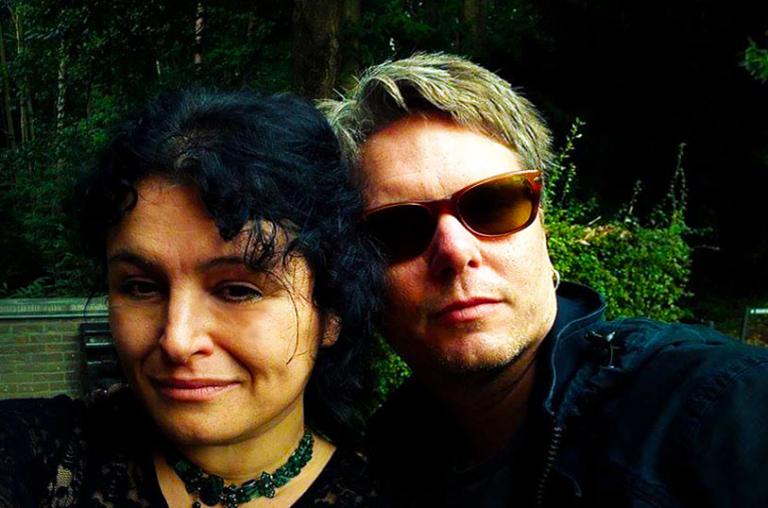
Sorita : A topic often raised among indigenous traditions around the world is the question of outsiders borrowing from their sacred spiritual practices, especially when that is done out of the context of the tribe those practice and beliefs are relevant to. There is a fair bit of “spiritual tourism” in some traditions, including Voudon, where quick initiations are offered for the desperately-seeking generation; and conversely aspects of the beliefs and practices being taken from those traditions and incorporated into New Age and contemporary Pagan practices. What is your take on this – natural syncretisation for the modern age, old fashioned consumerism or something else?
David: This is a very complex and I believe touchy topic these days. I find spiritual tourism very problematic and have always been critical of that ‘supermarket of religions’ where people throw concepts together to manufacture their personal religion. This is only possible in societies where an atomized humanity has lost all contact with the numinous and treats spiritual realities and spiritual forces like a mental game.
There is no question that all religions or spiritual systems change over time, adapt to new challenges and environments – nothing remains static, and change is good when it answers the pressing needs of the present. However, such change and innovation must and can only come from leaders and high initiates of the respective traditions. Only such people, the priestesses and priests, know the system well enough to understand where and which innovation can be introduced in order not to distort or disturb the essence of the system. This then is what the Sufis would call ‘lawful change’ while all other is amateurish meddling in something they hardly understand in its complexity and depth.
There are tremendous gifts which African and other indigenous spiritual systems and religions can offer to a sincere seeker – but one must approach with humility and readiness to involve oneself deeply, to throw overboard preconceptions and an overbearing sense of ego-consciousness. African traditions, in particular, are deeply rooted within community and relations between people but also between the individual, people and the cosmos at large, everything is connected. African spiritual traditions are also the manifestation of natural law which arises out of these relations. One of the powerful gifts of spiritual Africa is the possibility of re-integration into a numinous network of relations, the immediate experience of and engagement with the living cosmos.
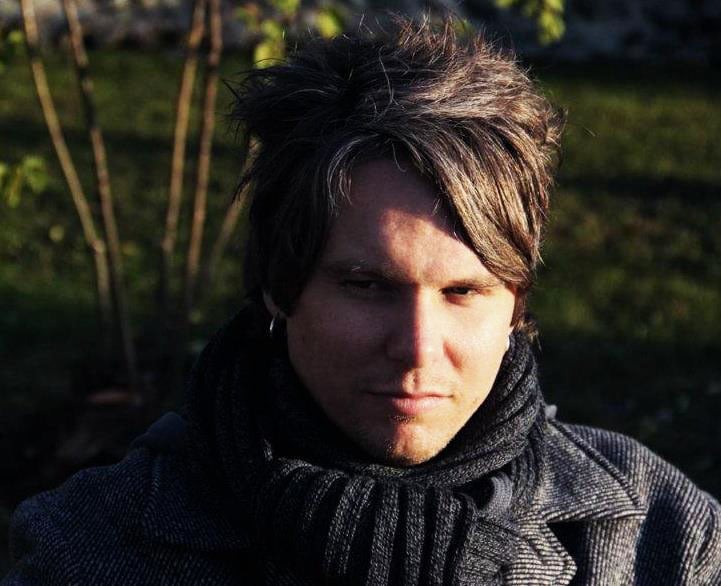
Sorita: What advice can you offer readers who are interested in seeking initiation and knowledge of Voudon and who are looking for a teacher or place to start?
David: First one should read some of the standard works on Vodou even though they also only present a fragment of the ‘real thing’ – Vodou is a living tradition, and it has no holy books, no pope or prophet, and thus we find no uniform given law which dictates the religion. True knowledge must be gained by engaging with the living reality of Vodou, with its initiates and spirits. So the next important step is to get a reading from a respected priestess or priest to determine which spirits one is associated with and what possible road may be open to oneself – not everyone is called to the same work or type of worship. After this, one can attach oneself to a Vodou Society to slowly move deeper into the Vodou cosmos.
Sorita : Are there any exciting new projects in the pipeline we should be looking out for?
David: I am always working on many projects, although most are reserved for the students of our Gnosis. However, as I am also the co-owner of Theion Publishing, I am always working on various fascinating esoteric books which I can recommend checking out. This said I do write the occasional essay to share with a broader audience and hope to finish my new book Ophidian Hieroglyphs this year, for a release in 2020.
Trivialities:
Your favourite book of all time? Of Cosmogonic Eros by Ludwig Klages
Your favourite character from history? Al-Khiḍr
Your favourite element? water
Your favourite food? Indian
Your favourite number? 3
Your favourite planet? Saturn
Your favourite plant? Rose
Your favourite stone? Obsidian
Your favourite Tarot / Oracle deck? Not much of a Tarot guy but I am ok with either Rider Waite or Thoth
Your sunsign? Gemini
Thank you David for taking the time to participate in this interview, and sharing your knowledge and story with readers here 🙂
Who is David Beth
David Beth was born to German parents in Angola, Africa. University educated in Germany and the USA, he has lived all over the world from Nigeria to Brazil and Los Angeles to London. Fascinated by the spiritual mysteries since childhood, David is a Houngan Asogwe (priest) of Haitian Vodou, a Gnostic Apostolic Bishop and an initiate of various Western and Afro-centric esoteric currents. Fully devoted to his Gnostic life and esoteric research, David currently lives and works in Germany if he is not travelling the globe. David Beth is also the co-owner of Theion Publishing, a fine edition esoteric publishing house.
To find out more about David Beth, go to:
Theion Publishing – www.theionpublishing.com
Kosmic Gnosis – www.kosmic-gnosis.org
And this article by Jessica Grote:
https://thespiritualsurvival.com/2017/09/16/the-war-in-heaven-and-the-mysterium-of-the-soul-approaching-david-beths-kosmic-gnosis

